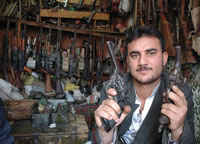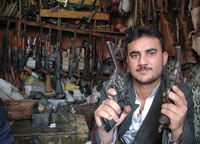
Yemen: Despite ban on arms, activists warn of increasing violence [Archives:2007/1067/Reportage]
July 12 2007
 |
Abdul-Rahman al-Marwani, chairman of local NGO Dar al-Salaam Organisation to Combat Revenge and Violence, told IRIN that the availability of small arms among civilians poses a threat to the country's stability and development.
“Firearms threaten the lives of citizens, security and development in Yemen as they help terrorist groups achieve their goals,” he said.
Weapons possession leads to armed conflicts within tribes, between tribes and clashes often occur between powerful tribes and government forces, al-Marwani added.
Weapons will be available so long as there are increasing demands by citizens to possess them. It is not a matter of closing arms markets down, but rather a matter of awareness [against gun violence],” the activist said.
He added that the problem lies in the lack of public will to stop using arms.
“Tribesmen don't trust the judiciary system in solving their problems, and that is why they resort to using power in settling their differences,” he said. “The rate of revenge will continue to be high.”
Al-Marwani said his organisation recorded 21 tribal clashes in 2006. “Tribal clashes claimed the lives of women and children, who were just victims of weapons,” he said.
Tribal clashes
Early June, five soldiers were killed and another eight were injured in armed confrontations between tribesmen and government forces in Marib governorate, 173 km east of Sanaa. The confrontations occurred after the armed men set up a checkpoint to stop cars on a public road, demanding that the government employs their relatives in a local oil company.
In the same month, armed clashes between tribesmen and government forces in the southern governorate of Shabwa claimed the lives of three soldiers and one civilian. The armed men resorted to using force to press security forces to release two of their detained relatives.
Government attempts
Yemen's Interior Minister, Rashad al-Alemi, said on 7 July that the government had formed committees to count and document firearms and ammunition belonging to security and military forces. The weapons' serial numbers will be registered in a database so that they can be detected should they be found in the wrong hands. He said this process would take about six months.
Al-Alemi added that the next phase would involve the government giving civilians a six-month period to give up their weapons for good.
Late April, the government decided to close down all markets that sell weapons, ammunition and fireworks after clashes escalated between government forces and followers of dissident Shia preacher Abdul-Malik al-Houthi in Saada, a province in the country's north.
Official report
A recent report released by the interior ministry said over the past three years 24,632 crimes had resulted from the mishandling of arms. The crimes led to about 5,000 deaths and 18,500 injuries, according to the report.
The ministry seized 13,000 guns, 3,115 pistols, 251 bombs, and over 41,500 other munitions in this period of time, the report added.
Another recent study released late 2006 by a university professor said that tribes had turned to abducting tourists in attempts to force the government to implement development projects in their areas. Tribesmen also resorted to abductions to get their relatives released from government detention, the study added. The study said 125 foreigners were abducted between 1991 and 2001.
Now, Dar al-Salaam is to conduct a nationwide study on weapons. It will count the number of small arms and their manufacturers and will also focus on the impact of misuse of arms on society.
“We keep in contact with members of parliament to discuss the possession of arms issue. We've sat with over 71 MPs and briefed them on the tragedy of people who had fallen victim to weapons. By this we seek to gather as many voices of influential figures as we can to raise this issue,” al-Marwani said.
Source: IRIN
——
[archive-e:1067-v:15-y:2007-d:2007-07-12-p:report]


